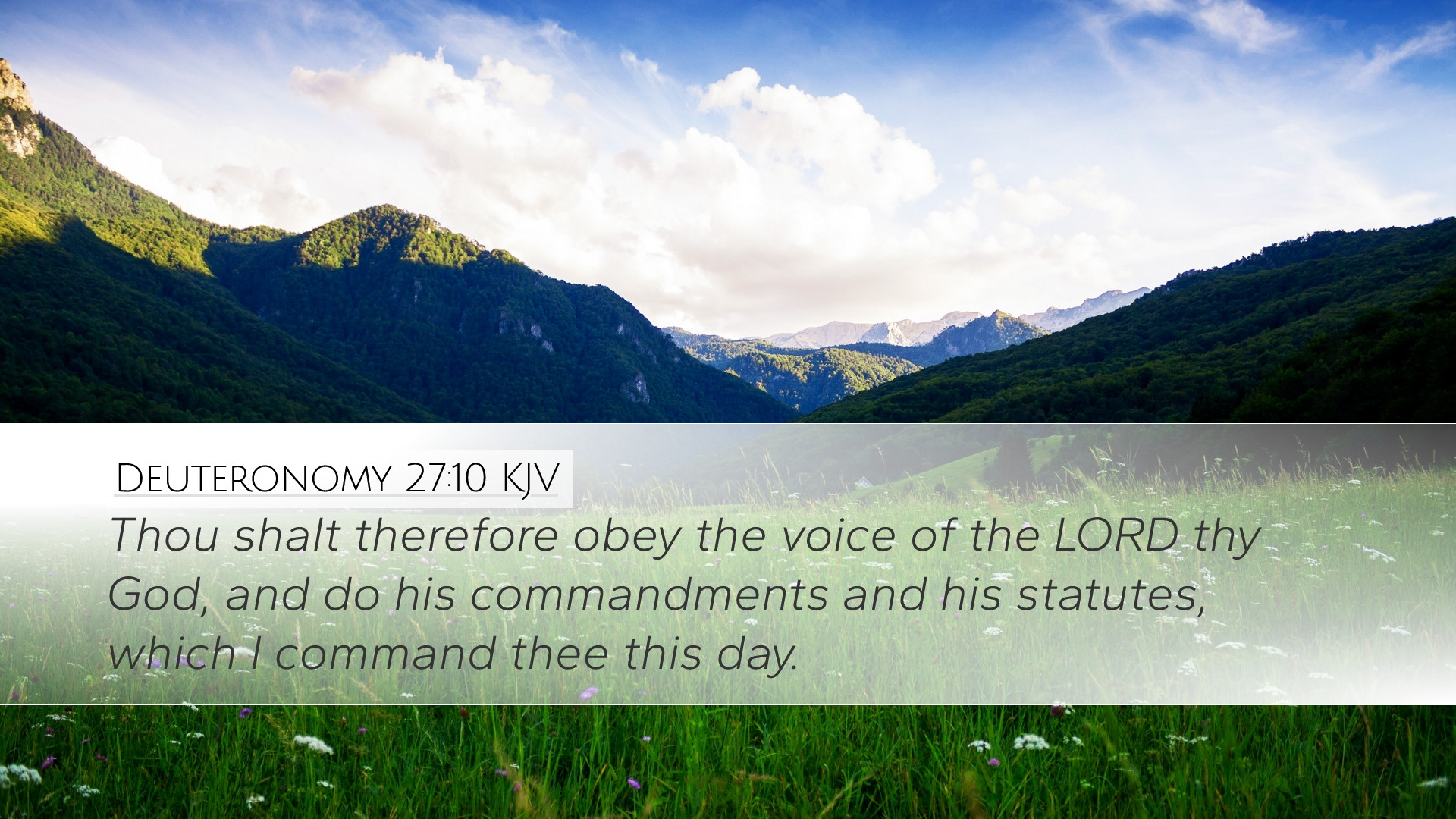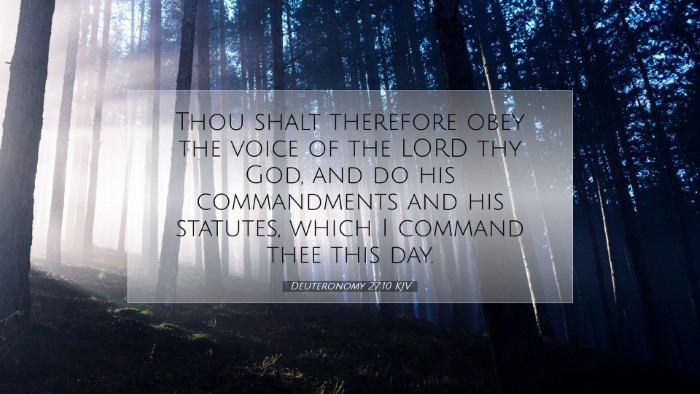Commentary on Deuteronomy 27:10
Verse Reference: Deuteronomy 27:10 - "Thou shalt therefore obey the voice of the Lord thy God, and do his commandments and his statutes, which I command thee this day."
Introduction
This verse encapsulates a profound and pivotal command within the covenant relationship that God establishes with Israel. It emphasizes the necessity of obedience and the active engagement in God’s commandments and statutes. The importance of this verse extends to understanding the obligations of God’s people, and its insights are critical for pastors, students, theologians, and scholars alike.
Exegesis and Theological Insights
Deuteronomy is often considered a restatement and reaffirmation of the Law given at Sinai, focusing on the necessity of obedience as a central theme. This verse serves as a foundational declaration of faithfulness that Israel is called to uphold.
1. The Voice of the Lord
Matthew Henry notes the significance of obeying the "voice of the Lord." This voice represents God’s direct communication with His people. It is an invitation to respond not merely through actions but with a heart attuned to divine instruction.
Albert Barnes elaborates on this point by suggesting that the voice signifies more than just the written commandments; it embodies the living word of God that requires attentiveness. Hence, true obedience stems from a deep, relational understanding of God’s will.
2. Obedience as a Covenant Responsibility
The call to obedience in Deuteronomy 27:10 underscores the covenant obligation that Israel has undertaken. Adam Clarke emphasizes that this charge exemplifies a lifestyle devoted to adherence to God’s statutes. The primary expectation is not just compliance but an active lifestyle that embodies the values of God’s laws.
This obedience is communal as much as it is personal. The Israelites were to commit collectively to these commandments, fostering a communal identity rooted in spiritual fidelity.
3. Commandments and Statutes
The verse mentions “commandments and statutes,” urging the worshippers of Yahweh to go beyond the mere execution of laws to a reflective observance of God’s righteous decrees. Matthew Henry interprets commandments as those precepts that are directly actionable, whereas statutes encompass broader principles of awareness and understanding of God’s holiness.
Albert Barnes further articulates that these commands (mitzvot) serve as ethical and theological guidelines, shaping the moral frameworks within which Israel is to operate. Their compliance would manifest the holiness of God in everyday living.
4. The Timing of the Command
The phrase "which I command thee this day" serves to ground the command in the present and immediate context. Adam Clarke indicates that God’s words are not merely historical but are urgent and relevant for the current situation of Israel. This point underscores the importance of active, present-faith obedience rather than looking back nostalgically to past deliverance.
Implications for Today
For contemporary readers, Deuteronomy 27:10 presents enduring truth and application. The call to obedience remains a central theme throughout the Scriptures, echoing in the teachings of Jesus and the apostolic literature. This verse encourages believers to develop a responsive heart to God’s voice while actively engaging in the life of faith dictated by the Holy Scriptures.
Application for Pastors and Leaders
For pastors, this verse encourages teaching that emphasizes the necessity of obedience not solely as a duty but as an expression of love for God. It challenges leaders to cultivate environments where congregants seek to hear God’s voice clearly and respond with commitment. Matthew Henry urges shepherds to remind their flocks that divine command is not burdensome but a pathway to faithfulness and spiritual growth.
Application for Scholars and Theologians
Biblical scholars are invited to explore the theological implications of this verse within the broader narrative of Scripture. Studying this element of covenant faithfulness can yield insights into God’s character and His expectations of His people. The articulation of commandments and an understanding of their purpose will foster deeper theological reflection on the nature of obedience and grace.
Conclusion
In summary, Deuteronomy 27:10 serves as a vital reminder of the call to obedience in the life of God’s people. It encapsulates the essence of covenant relationship, emphasizing that true commitment is demonstrated through responsive actions to God’s commandments. The insights from public domain commentaries deepen our understanding of this verse, encouraging believers today to reflect on their responsibilities as followers of Christ, echoing the timeless principle of loving obedience to divine authority.


